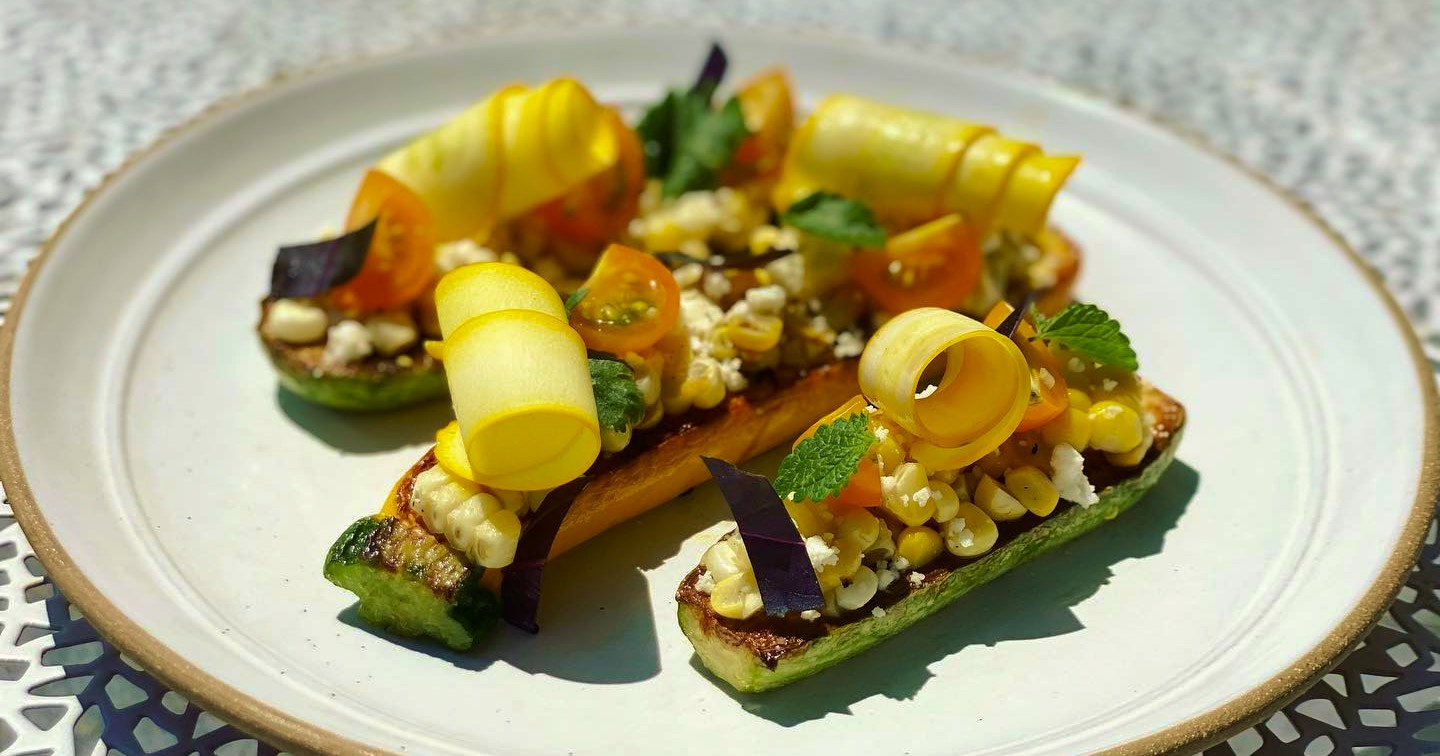
Dreams of a Dinner Unfulfilled: A “Review” of Birch
One part imaginary restaurant review. Two parts Omicron fever dream. Here’s a fantastical journey through the Birch menu.
I remember running my thumb across the blade of a Japanese chef’s knife and thinking, “This is the sharpest knife I’ve ever held.”
Maybe I was delusional—I surely wasn’t in the greatest emotional state at the time. My father had just passed away the day before, and I had discovered among his belongings the set of knives that he had planned on gifting to me for an upcoming birthday or Christmas.
Having a sentimental set of knives like that is a funny thing. You want to use them—which means getting them dirty and dulling the blade over time. But at the same time, they are one of the most meaningful items in your possession—a literal parting gift from someone you loved more than anything. Part of you wants to cherish them and admire them from afar, never to come into contact with a raw chicken breast ever again.
About a year and a half later, that knife wasn’t anywhere close to being the sharpest knife I had ever held. Vegetables no longer cowered in fear when the blades were pulled from their cardboard sheathes riddled with Japanese kanji. The time had come to have the knives sharpened—but I didn’t trust myself with something so important.
A friendly face came to mind—someone I’ve watched hammer away at smoldering hot knives and swords on social media under the handle @zimknives, the name for his small knife-making business.
It’s tough to say exactly when I met Nate Zimmerman, but a moment that stands out to me was when we ran into each other at a bar—most likely in the Riverwest neighborhood. I was wearing a movie poster t-shirt for the 1980 film Shogun Assassin—an ultra-violent samurai flick that made its way overseas to America in 1980. The film is a cult classic—its only mainstream spotlights being a few dialogue samples in GZA’s classic 1995 hip-hop album Liquid Swords, and an appearance in the Quentin Tarantino love letter to Japanese swordplay, Kill Bill, as the movie that The Bride watches with her daughter. So you can see why I was taken aback when Zimmerman’s face lit up when he recognized my shirt—I think it was the first time anyone had known what it was.
After getting to know Zimmerman, it makes sense why he has a love for old samurai flicks. He’s a man who has loved weapons his entire life—not in a weird, concerning way, but in a nerdy, roleplaying way. He recalls a moment when, as a child, his cousin gave him a plastic pirate sword.
“I would always make swords, and my friends and I would sword fight,” Zimmerman says.
That craftiness carried over to his family life as well. Zimmerman’s father, an electrical and computer engineer, was a handyman with a workshop. Thanks in part due to a lack of interest from his sibling, Zimmerman became the handyman’s assistant. And when his father was out, Zimmerman became the foreman of his own little world.
“Instead of playing with toys, I would get a roll of duct tape and cardboard and just build stuff,” Zimmerman says. “Legos were a huge thing too—any sort of creative outlet was my favorite.”
In school, Zimmerman excelled in his art and tech ed classes. In those courses, he showed an interest in jewelry making, prompting his parents to buy him a set of pliers and a spool of silver wire for Christmas one year. Zimmerman practiced crafting jewelry, gifting his mothers the products deemed worthy.
Nowadays, it’s rare for Zimmerman to just give away his pieces. On his website, his blades are listed at anywhere from $450 to over $1,000. As of this writing, Zimmerman estimates that he has sold around 150 knives and swords. His knives have been sought after by top chefs in the city—in fact, James Beard award nominee Justin Carlisle, of Ardent and Red Light Ramen fame, commissioned Zimmerman to make custom steak knives for his restaurant. The down payment for that job allowed Zimmerman to afford the first month’s rent at his current workshop—effectively moving his operations from his parent’s basement and garage and into a space of his own.
“It was completely empty when I moved in—now it’s packed with tools, wall-to-wall, and my capabilities have expanded so much,” Zimmerman says. “It’s sort of become a private sanctum—a solace space for me.”
One of those tools—a forge—was purchased in preparation for a short stint on the History channel series Forged in Fire. Zimmerman had talked his way onto the show, with having close to zero experience actually forging a knife. You see, up until this point, Zimmerman had been making his knives via a method called stock removal. That process uses saws, belt sanders, and abrasives to strip materials away from a piece of steel. Whereas a forge will utilize heat to reshape a piece of steel, stock removal involves quite literally eliminating pieces until the desired shape has taken. So to prepare for his national debut, Zimmerman purchased a forge, stumbled his way through two knives, and took on the competition. His knife didn’t even make it to the testing portion of the episode—it was heavily cracked due to improper heat treating and forging. He was eventually invited back for a redemption episode that aired this year—where his knife made it to the testing portion, but broke in the process.
“I’m more excited about having a highly skilled chef say that my knife is good than going on a TV show, but it was a wildly fun experience and it’s cool to be recognized for that,” Zimmerman says.
And recognition around Milwaukee comes in many forms for Zimmerman. For example—maybe you’ve had dinner at Birch—the restaurant formerly known as Birch + Butcher. The restaurant’s website claims that patrons will “... notice the flames in the open hearth dancing the minute the minute (they) walk into the dining room ...” Well, the adjustable grill racks fitted inside that hearth were crafted by Zimmerman.
One part imaginary restaurant review. Two parts Omicron fever dream. Here’s a fantastical journey through the Birch menu.
“I always sit at the chef’s counter in front and stare at it,” Zimmerman says. “It’s gotten so beat up but it’s cool to see the change over the years. My favorite part about making stuff is having people who use it be satisfied with it.”
On the internet, I wouldn’t be surprised if Zimmerman eventually gained viral notoriety as the “guy who made the It’s Always Sunny in Philadelphia sword.” A piece commissioned by a gaming friend, Zimmerman forged a Dayman sword—inspired by one of the most iconic episodes of the series. While Zimmerman enjoys working with knives, it’s unique projects like this that really get him excited.
But in between the elaborate and ornate projects, Zimmerman is quite literally grinding away—crafting chef’s knives and knife accessories like sheathes and magnetic strips and offering a knife sharpening service through The Sharp Brothers. After all, it’s what brings me to his workshop one Monday afternoon.
Zimmerman takes my knives and handles them like a pro—sliding the knife back and forth on a whetstone as he tells me about an upcoming Warhammer tournament he’s entering. I notice a dollar bill taped to the cushion of his work chair. I ask if it’s the first dollar he ever made on his craft.
“Nah, I just taped that there during a party” he says with a laugh. “I spent my first dollar on rent a long time ago.”
There are medieval weapons—purely costume accessories—adorning the walls. A Tekken arcade cabinet sits collecting dust—a repair that Zimmerman reminds himself that he’ll get to eventually. The space sort of feels like a man cave, except not—the flames that heat pieces of steel up to 800 degrees make sure of that. It’s in this space that Zimmerman’s life has come full circle in a way—his father, now retired and in need of more work space, comes to use Zimmerman’s tools—a literal 180 from Zimmerman’s pretend pirate sword days. On another occasion, Zimmerman bumped into his middle school jewelry teacher at a farmer’s market, inviting him to stop by the shop and learn how to forge a knife. The student became the master, and Zimmerman’s old teacher got to walk out of the shop with a brand new knife.
Zimmerman demonstrates that my knives have been restored to their former glory by effortlessly cutting a sheet of paper in half—the blade catching and gliding like scissors on wrapping paper.
Maybe it’s the former line cook in me talking, but effortless cutting through vegetables or potatoes with a sharp knife is a euphoric feeling. Every time I cut with those knives—anytime a loved one enjoys a meal prepped by those knives—I’m reminded of my late father. I know it’s an experience and a memory specific to my life, but that just means that other blades have their own meaningful backstories as well. Talking with Zimmerman and watching him work, I’m certain that he knows it too.
And just like his signature that resides on each blade near its handle, Zimmerman is leaving his mark on the chefs, artists, and anyone with an interest in hand-crafted blades in Wisconsin.
More Articles by Mike Holloway
Aug. 8, 2023
•11 min read
Aug. 13, 2019
•3 min read
Dec. 13, 2018
•5 min read
About the author
Mike Holloway was the music editor for The Wisconsin Gazette until it ceased publication in Sept. He currently writes for 88Nine Radio Milwaukee, Milwaukee Record and Urban Milwaukee.






